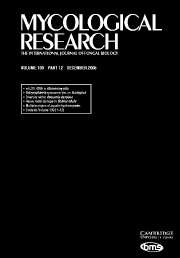Article contents
Specific and sensitive PCR-based detection of Septoria musiva, S. populicola and S. populi, the causes of leaf spot and stem canker on poplars
Published online by Cambridge University Press: 17 August 2005
Abstract
The development of a PCR assay for the detection of the poplar pathogenic fungi Septoria musiva (teleomorph Mycosphaerella populorum), S. populicola (M. populicola) and S. populi (M. populi) is described. Three pairs of species-specific PCR primers were designed using interspecific polymorphisms in the internal transcribed spacer (ITS) of nuclear ribosomal RNA gene (rDNA) repeats. The specificity of the three primer pairs was successfully tested on a collection of 40 S. musiva, 39 S. populicola and six S. populi isolates. Using stringent PCR conditions, no cross-reaction was observed with any of the isolates tested. The specificity of the PCR assay was further confirmed with DNA extracted from 12 additional Septoria species and 17 other fungal species obtained from stems or leaves of poplars. Specific amplification of the fragments for S. musiva and S. populicola was sensitive relatively to the technique used, detecting as low as 1 pg template DNA, and 10 pg of DNA of the target species in a background of 1 ng of DNA of the other species. Moreover, using DNA purified directly from disrupted conidia, it was possible to detect with a probability of 90%, using one unique PCR assay, the DNA equivalent of 166 conidia per μl of S. musiva and 156 conidia per μl of S. populicola. The procedures developed in this work can thus be applied for rapid and accurate detection and identification of Septoria species from poplars.
- Type
- Research Article
- Information
- Copyright
- © The British Mycological Society 2005
- 14
- Cited by


